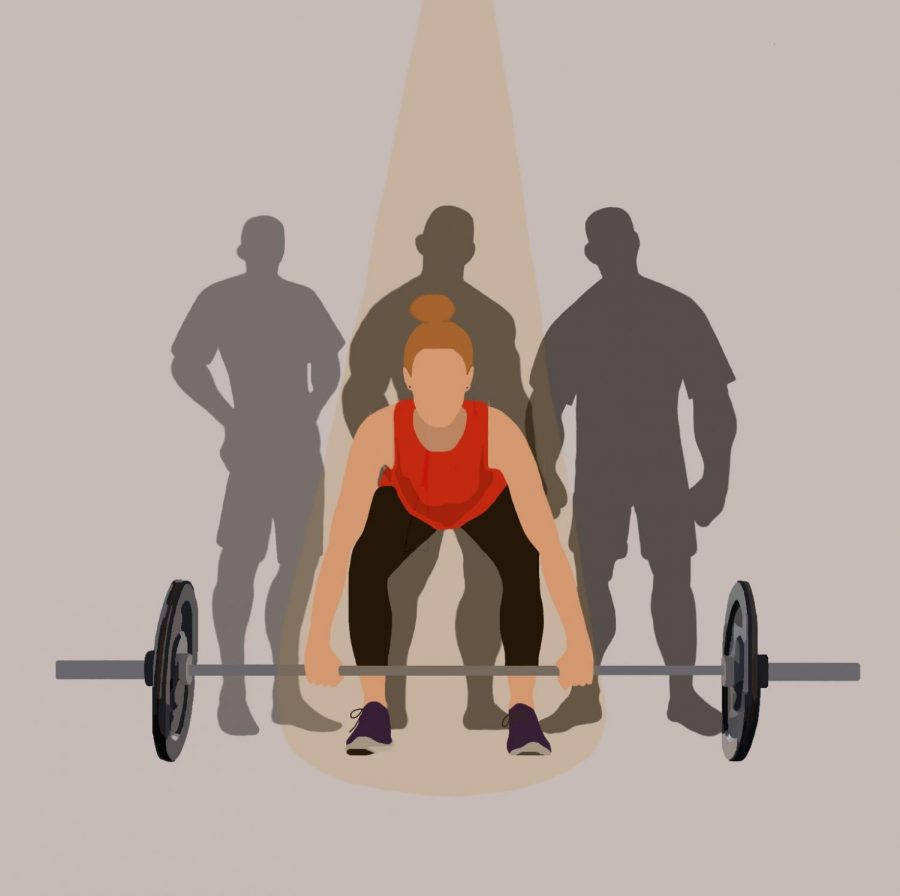OPINION: Women in the weight room
Overcoming feelings of insecurity and uncomfortableness
October 27, 2020
When at the gym, most girls tend to steer clear of the weight room and go directly to the treadmills and ellipticals. While an ultimate fitness goal of most women is to burn fat, most of the “desired” body types we see on social media that women strive to look like are conceived in the weight room. Resistance exercises are extremely important and one of the most beneficial exercises one can do, helping to improve bone density, and preventing falling later in life. It makes athletes stronger and quicker in all aspects of their sports, and keeps people’s bodies from being in a state of constant pain when they start to deteriorate through aging.
After one full year of consistently lifting weights, I still have much to learn and a lot of room for improvement and yet, so much has changed for me beyond physical appearance. I began to notice an improvement in my athletic abilities (I added two inches to my vertical in the span of four months). My self esteem had improved tremendously and I was no longer self conscious about being the largest person in my friend group. It fixed my relationship with food, causing me to want to eat often and eat foods that fueled my body so that I could build muscle, rather than eating one meal a day and constantly feeling faint. I let myself eat dessert without beating myself up for it. My confidence has improved so much that I step up and do things that I would never have dreamed of doing before.
When I first started going to the gym, I knew I wanted to lift weights but I tended to stay in the machine weight room, that was more out in the open where mostly older women and not as many intimidating men went. I had done compound barbell lifts from taking a year of weight training classes, but was still self conscious about my form and how much I could lift, as I assume many women are. I was hardly ever sore after my workouts and I knew that if I wanted to make any progress I had to suck it up and go into the bigger weight room, so that’s what I began to do.
Guys who feel like they dominate the weight room tend to like showing off their weight numbers, and sometimes make girls feel bad about theirs. But the matter of fact is, girls don’t have the same level of testosterone as most guys and are just not naturally built to lift as much as guys. When a girl is able to meet the same numbers as a guy, that girl has talent. Senior Grace Nichols is one girl that can meet this expectation.
Nichols is a starter on the LSE Varsity Volleyball team and gives credit to weight training for her success. Her lifting career began in eighth grade with volleyball conditioning and lifting at LSE after school with her friends.
“When I was a freshman, I was really skinny, and I was like a noodle. I was on reserve volleyball, and I didn’t play. And then I found that lifting was something I could do that not a lot of girls knew they should be doing and it just was something that I could get my energy out. It was something I could go to for my emotions, and it made me feel strong and powerful. It really helped me get to being the volleyball player I am now: being strong, and also giving me my confidence,” Nichols said.
Lifting weights for women has always been considered kind of taboo, only becoming more common in the past few years because of many trailblazers who decided to begin, despite judgement. The judgement was caused by ignorant rumors that lifting would harm a woman’s reproductive organs and cause them to bulk up and “look like a man.” But the reality is that’s not what it will do to you.
“A lot of girls in today’s society think that they should just go on diets and stay super skinny but that is the complete opposite of what’s best for your body,” Nichols said. “Lifting weights will not make you look masculine unless that’s the look you’re going for.”
More women are realizing this and lately lifting has become more common. According to the USA Powerlifting Women’s Committee there were 6,525 competitive female powerlifters in 2017, up from only 928 in 2011. Seeing people bridge this gap seemed to play a big role in helping many other women take that first step into the weight room.
While the “lifting heavy weights only being for men” stereotype is getting closer to being broken, data from the Center of Disease Control and Prevention (CDC) reveals that 57% of men meet the recommended aerobic activity level while only 49% of women do. Sure, some might say that women just coincidentally tend to be more lazy, but I think that is an inaccurate statement. I have met countless women that want to workout more, but don’t even know where to start. In my opinion, the reason women are timid to start is because there’s so much stigma and false information out there about it that they don’t feel welcome in the gym environment and continue to shy away from it.
For many girls I think it’s a constant struggle to get a good workout when there are so many things they’re worrying about. Not lifting to your full potential happens often from fear of not being able to lift it, and having to give up in front of everyone’s stares sounds like a nightmare. As a female in the weight room you try to blend in, making certain that you’re not stealing someone’s equipment or trying to stay out of people’s way by only going to the emptiest spaces, which limits your options.
In the weight training rooms at LSE, although I feel safe, it is probably where most girls feel the most self conscious. Being surrounded by peers who are teenage boys that can lift double the amount they can can be intimidating and embarrassing.
Nichols admits that insecurity around males was a big struggle she had to overcome.
“I would make sure my pants weren’t see through. I wouldn’t push myself as hard. I was lifting enough for guys to notice, and watch me, and when we would max out I always made sure that [an LSE weight training teacher] was grading someone else and that no one was looking over at me because I didn’t want attention drawn to me,” Nichols said.
Nichols prefers to lift at LSE in the advanced weight training class rather than a public gym because she feels a lot more comfortable and safe there. She says that although it did take her a while to get comfortable with her abilities and lifting around others, something that most likely helped was her being thrown into the class with her friend who needed a lifting partner her second semester of freshman year, and she felt like she did belong there and was strong enough for the class.
Besides the feeling of being judged or not belonging by the other men in the gym environment, I have also had many unpleasant experiences time and time again. Just to name a few, a man approached me at the gym the other day and said to me, “you look fantastic today.” Two other older men will stop me mid set just to have a twenty minute conversation that I feel like I can’t get out of or be rude. Another man complimented my hair when it was put up in a gross, messy bun. Every time those things happen, I instantly retreat to my safe space, the locker room, and try to recuperate and build up the courage to go back out there. And again, I have difficulty not being super nice back because who knows what’s going through their head. Maybe they just thought they were being nice and are unaware of how those comments can come off. It’s gotten to the point where I have to ask myself if it’s my fault that people choose to talk to me because of what I’m wearing. I try to remind myself that it’s not my job to control other people, but I just want to wear what I feel most comfortable in without feeling unsafe and constantly having to worry about what side of my body is facing where when I’m squatting.
So what are some solutions? Well for starters, gyms could make weight rooms out in the open and less like a cave like what they tend to be. They could make the equipment a lot more user friendly with tips on how to use them and how to set it up. There are almost no women’s barbells in the gym I go to, which only further increases the stigma. Personally I believe the biggest solution would be to install more “women’s only” weight rooms, and maybe even an all girls weight training class here at LSE. It doesn’t have to be required that all girls have to take the girl’s class, but I think it would make a lot of girls feel more comfortable and encourage them to start lifting weights. The only conceivable problem with this solution is that one all girls class would fill up quickly or wouldn’t fit with everyone’s schedule. Girls who can’t get into the class or don’t want to be in it would end up most likely being one of the only girls in the co-ed classes, leading to a worse situation than before.
For Nichols personally, she’s a very competitive person and likes trying to out-lift other guys, but she thinks all women weight rooms are a great idea for self conscious and uncomfortable girls who lift, especially for those who are new to it. They should be able to show off their lifting skills once they feel comfortable with themselves enough to do it.
This idea was supported after talking with Sophomore at Lincoln Southwest(LSW), Thea Gardner, who is new to lifting and attends Good Life Fitness, a gym with a women-only weight room. She said that she loves the fact that she can go into the weight room and not feel judged or get stared at.
“I’ll feel a lot more comfortable doing squats and other lifts than if I was out in the co-ed room, “ Gardner said.
Those are just some ideas for physical solutions, but the main problems are all mental. These fears and worries are something that we all collectively as women have to overcome eventually to achieve our goals, and we must learn that putting ourselves in uncomfortable situations is what helps us to grow. Here are a few tips Nichols gave to help overcome these feelings:
- Focus on your goals: “Don’t worry about anybody looking at you because you’re bettering yourself and making yourself healthy and setting and achieving your goals. You shouldn’t worry about what other people are thinking, or if they’re looking at you.”
- Strength is not based on physical appearance- “If you’re uncomfortable about how you look– if you feel too big or too skinny– I would just say it does not matter. I see very strong girls and they are smaller than me and there’s also ones that are bigger than me.”
- Prove the stereotype wrong and act like you belong there even if you don’t believe it- “I think society has just told us that we shouldn’t be in situations where we can be strong; just showing people that you can be strong or you can go to a gym, I think that’s what your motivation should be to feel more comfortable.”









